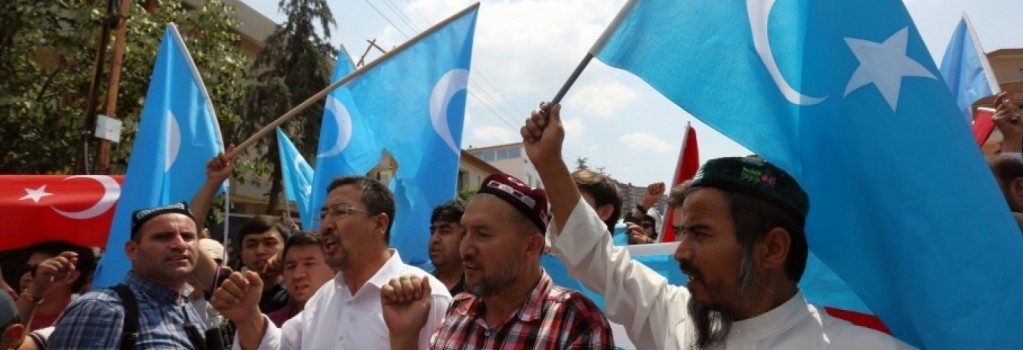Thailand’s controversial decision this week to deport about 100 Uighurs, ethnically Turkic Muslims from China’s far west region of Xinjiang, sparked worldwide concern.
As my colleague Simon Denyer reports, rights groups warned of the “grim” fate likely to befall the Uighurs once they were forcibly returned to China. The U.S. State Department expressed concern that some of the Uighur refugees “could face harsh treatment and lack of due process.”
In Turkey, there was outrage as well. On Thursday, dozens of protesters clashed with riot police outside Thai and Chinese diplomatic missions in Ankara and Istanbul. These included many ethnic Uighurs, waving the blue flag of East Turkestan, the name some use for the territory that’s now Xinjiang. The windows of the Thai consulate in Istanbul were smashed by angry demonstrators.
China’s much-criticized treatment of the Uighurs is a sensitive subject in Turkey, where the national narrative embraces other Turkic ethnicities elsewhere. In the past month, reports that Beijing was suppressing the ability of ordinary Uighurs to practice their Muslim faith and properly observe the holy month of Ramadan inflamed public opinion in Turkey.
On June 30, the Turkish government issued a statement expressing “deep concerns” with news of bans on fasting and on children attending mosques.
The Turkish connection to the Uighurs runs deep. The first Arabic compendium of the Turkic language was penned for the Caliph in Baghdad in the 11th century by a scholar from the Silk Road oasis town of Kashgar, now a city in Xinjiang whose historic quarter has been largely bulldozed by Chinese authorities in recent years. When Uighur-Chinese riots convulsed the far-western region in 2009, Turkey’s then-prime minister (now President) Recep Tayyip Erdogan complained that Beijing was presiding over “a kind of genocide.”
This week, Erdogan has been slightly more circumspect, calling for calm and for Turkish citizens not to believe everything they hear about Chinese rule in Xinjiang.
“We have kin in every corner in the world. … So claims about China’s pressure on our siblings in [Xinjiang] lead to sensitivity in our public,” Erdogan told a meeting of diplomats in Ankara. “However, to a great extent the images and reports circulating in the media have made this sensibility prone to exploitation, deliberately or not.”
Like clockwork, an article by the official Turkish state news agency detailed how most Uighurs in Xinjiang were able to adequately observe the requirements of their faith during the holy month of Ramadan.
Erdogan, in part, was directing his comments at the far-right Nationalist Movement Party (known by the initials MHP), whose supporters have fueled the anti-Chinese protests in recent days and even carried out attacks on East Asians.
On July 4, a group of MHP-affiliated youths assaulted Korean tourists in Istanbul’s historic Sultanahmet district. The previous week, ultra-nationalists ransacked a Chinese restaurant in Istanbul and roughed up the cook, who — they perhaps didn’t realize — happened to be an ethnic Uighur.
The MHP’s leader, Devlet Bahceli, distanced his party from the incidents, but not before complaining how difficult it is to tell the difference between “slanty-eyed” Koreans and Chinese. He also accused Erdogan of not doing enough to stand up for the plight of the Uighurs in China.
China, for its part, issued a travel warning to its nationals in Turkey as well as a July 6 statement denying the reports in Turkish media.
“Uighurs live and work in peace and contentment and enjoy freedom of religion under the rules in the constitution,” a Chinese Foreign Ministry spokeswoman said at a briefing.
That’s a dubious claim. As Denyer has reported on numerous occasions, Beijing, on the pretext of cracking down on religious extremism, has embarked on a systematic campaign against aspects of Uighur Muslim life, including restrictions on the wearing of the veil and even the length of one’s beard.
According to the accounts of some Uighurs, Denyer writes, it has “now become an all-out war on conservative Islam.”
Source: washingtonpost.com

Leave a Reply